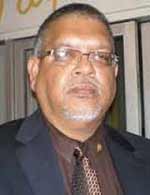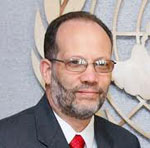An in-depth focus on Caribbean issues
CARICOM CHAIRMAN REPORTS PROGRESS IN KEY AREAS
AS CARICOM Heads of Government prepare for their annual Summit, the outgoing Chairman, St. Vincent and The Grenadines Prime Minister, Dr. Ralph Gonsalves, is reporting “incremental and steady” progress on several initiatives that are critical to bolstering the regional integration movement.In a recent conversation with Gonsalves, he advised that there has been considerable progress in getting the CARICOM Secretariat’s Draft Strategic Plan completed and the agenda at the Summit in Antigua and Barbuda will

also include comprehensive recommendations from the CARICOM Commission on the Economy. The Commission is recommending both joint and country specific immediate action in the areas of financial sustainability including debt management, private sector stimulation, the business regulatory environment and resource mobilisation.
Decisions are expected to be taken, according to Gonsalves, on proposals from the CARICOM Transportation Commission. There has been significant progress in collaboration among the Caribbean air carriers on ways to provide a more efficient, reliable and affordable air service to the Region.

Gonsalves, who is keen on seeing more CARICOM Governments take a stake in the ownership of regional carrier LIAT, admitted there has been no movement in this area and remains convinced that major improvements in terms of LIAT’s operations and viability are dependent upon an injection of major new capital. He confirmed that despite his pleas, St. Lucia would not follow Dominica and become a shareholder in LIAT.
On External Relations, one area where there has been an impasse is the CARICOM-Canada negotiations for a new trade and development accord, which both sides had initially targeted to be completed by mid-2014.
CARICOM leaders are now pursuing “an engagement” with Canadian Prime Minister Stephen Harper to discuss how to remove the current stumbling blocks.
While the talks are stalled, Gonsalves indicated that the Canadian Government has been allowing Caribbean traditional exports that have entered the Canadian market duty-free to continue receiving preferential treatment.
The World Trade Organisation (WTO) waiver for the Caribbean-Canada Trade Agreement CARIBCAN, the one-way non-reciprocal agreement which accorded CARICOM countries duty free access to the Canadian market for most imports originating from the Commonwealth Caribbean, expired on December 31, 2013.

The Organisation of Eastern Caribbean States (OECS) group is particularly concerned about losing customs revenue from Canadian products entering the Caribbean duty free.
Canada’s concluded FTA’s with countries such as Chile and Peru do not have an aid component. An official of the Canadian Department of Foreign Affairs, Trade and Development told me Canada does not negotiate development assistance in the context of international legally binding trade treaties and pointed to programmes for the Caribbean under the Canadian International Development Agency (CIDA).The official said, Canada is committed to seeking an “ ambitious outcome” from CARICOM that “addresses the core interests and sensitivities of both sides” and like in all trade agreements the Federal Government negotiates, it works closely with the provinces and territories.
The Canadians want to ensure that they do not get less favourable treatment than that accorded by CARICOM to the European Union under the Economic Partnership Agreement (EPA) especially in the areas of services exports and investment.
CARICOM countries have a list of sensitive products they are not willing to liberalise and are looking for an improved market access offer.
Standard in all of the FTA’s Canada, as concluded, are labour and environmental side agreements and an Investor Dispute Mechanism. CARICOM has concerns in all of these areas, though the Region’s private sector has no issue with these being part of the accord.
The Caribbean Association of Industry and Commerce is among those groups that feel there was not enough input from the Region’s private sector prior to and during the start of talks.
CAIC President, Guyanese business executive Ramesh Dokhoo, believes the issue of Federal negotiators who do not have the legal authority to impose conditions at the state level, puts the Caribbean at a disadvantage , especially in areas such as rum exports.
On reciprocal duty free access, Dookhoo commented that local manufacturers will be at a disadvantage in terms of competing with Canadian companies those which possess larger economies of scale and lower production costs.
The former President of the Private Sector Commission also advised that CARICOM countries need urgently to harmonise SPS (sanitary and phytosanitary) standards to ensure that there is a unified response to companies entering the Canadian markets.
For the first time in years, the Heads of Government will engage regional private sector leaders at their annual Summit.
CARICOM Secretary General Irwin La Rocque has pointed to an “urgent need” to strengthen the institutional capacity of private sector support organisations.
While the outgoing CARICOM Chairman welcomes the re-engagement with private sector groups, Gonsalves believes that these organisations should submit well-researched papers with specific recommendations that could first be considered by the Council for Trade and Economic Development (COTED) and then Heads of Government could provide feedback on what is feasible and identify areas for public-private sector partnerships.
What is not productive in his view is business and other civic leaders making speeches at the annual Summits and raising issues that the CARICOM leaders will hear about for the first time.
While acknowledging deficiencies in some aspects of the CARICOM Single Market and the Economy (CSME), Gonsalves pointed to several areas where companies are doing business across the Region unimpeded, utilising, among other things, the Rights of Establishment. “In effect, the revised Treaty of Chaguaramas is working in many areas.”
The Vincentian Prime Minister has also been pressing his CARICOM colleagues to take action to implement programmes addressing energy access, cost and reliability.
Gonsalves concedes that implementation of CARICOM decisions will continue to be challenging unless there is a CARICOM Commission type structure as proposed by the West Indian Commission in its “Time for Action” report but the Region’s leaders are unlikely to go down that road.
Gonsalves feels it is not the individual “Change Drivers” in each Member State that will have the most impact in pushing the integration movement forward, but the Regional Integration Units in each country, which need to be equipped with experienced and qualified persons. In St. Vincent and The Grenadines, the unit is staffed with seven University graduates and headed by an Ambassador.
In most CARICOM countries, this Unit is a one-man operation and is manned by junior civil servants.
The outgoing CARICOM Chairman feels another area that requires the availability of substantial new capital is major agricultural expansion, which has been promoted under the Jagdeo Initiative. While there have been new Barbadian and Trinidadian investments in Guyana, Gonsalves contends that major new investment has to be secured to finance projects that could help reduce the spiraling food import bill.
Attracting new investment to the Region would be a much smoother process with the implementation of the long mooted CARICOM Investment Code, which, according to the CARICOM Secretary General is at an advanced stage, along with work on a regulatory framework for Financial Services.
Updates are also expected on the work related to medical marijuana, which the Vincentian Prime Minister champions, but not all of his colleagues are on board with this.
Hopefully, details, such as specific strategies, goals and timetables regarding the recommendations of the CARICOM Commission on the Economy, the Regional Transportation Mission, the Strategic Plan and new governance arrangements, among others, will be available after the Antigua meeting.
Antigua and Barbuda’s newly elected Prime Minister, former banker Gaston Browne, whose Antigua Labour Party (ALP) recently won a landslide victory at the polls, is a newcomer to the CARICOM fold who will have the opportunity to ensure that some of the critical projects on the table are translated into action with meaningful and visible results.
(Sandra Ann Baptiste is a business consultant and specialist in Caribbean Affairs)
(Sandra Ann Baptiste )





.jpg)








